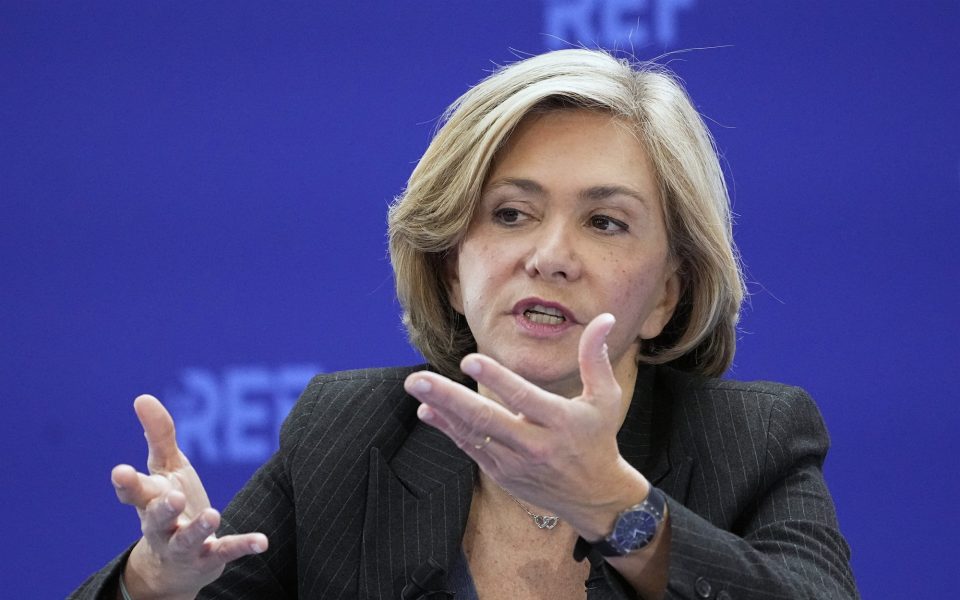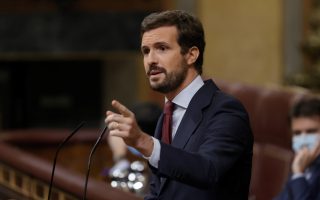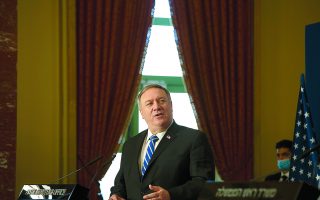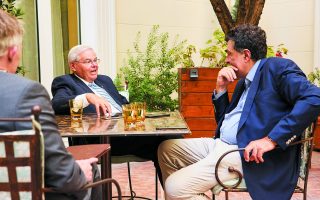‘I will oppose Turkey’s integration into the EU’
Conservative contender in the French presidential election on Ukraine, migration and the Greece-France defense deal

Turkey has no place in the European Union and any pre-integration assistance given to the government of President Recep Tayyip Erdogan must be opposed, the center-right Republicans’ candidate for the French presidency, Valerie Pecresse, tells Kathimerini in an exclusive interview.
Regarded as the main contender against incumbent Emmanuel Macron in April’s elections, Pecresse describes the recent defense agreement signed between France and Greece as a “pledge for peace and stability in the Eastern Mediterranean,” and stresses the need, in light of developments in Ukraine, for the European Union to speak in one voice on matters of security so that it can gain more influence, while decrying “solitary diplomacy.”
She also expresses agreement with Greece’s recent migration policy, saying that it reconciles “migration control and human dignity,” and adding that she is in favor of strengthening the European border agency, Frontex, with more resources and capabilities.
Pecresse hails the Greek government’s “courageous job of restoring the country’s economy,” noting that France must also take steps to reduce its debt and expenditure.
“I’m at the barycenter of the right, and that’s why I think I can beat Emmanuel Macron,” she says.
The French economy grew at a rate of 7% in 2021, the highest since 1969. Of course in 2020 there was an 8% recession due to the pandemic and the French public debt is now at almost 120% of GDP. What is the central idea of your proposal for the second largest economy in the eurozone?
Indeed, it is important to remind our compatriots that French growth had fallen by 8% in 2020, one of the strongest drops in Europe, and that it only increased by 7% in 2021. We are still far from the growth of 2019. Nothing to triumph over. France will emerge weakened from the Covid crisis, which is not the case for all our neighbors, especially Germany. Today, we no longer have room for maneuver: colossal debt, abysmal deficit, record levels of compulsory levies, administrative red tape at all levels. France is failing. It is not normal that it takes six generations today for a worker’s child to become an executive. It is unfair. It is not our right. Our right values work, merit, effort. One of my main measures will be to exonerate young entrepreneurs for the first three years, to give them enough air to develop and launch their projects in the best conditions. We must put work value back into our growth strategy.
Growth with the state or growth with the private sector?
Private sector, but we must do so in agreement with the state, to make it more efficient, in the service of the people. One must accompany the other, the other must support the first.
If you were in the Elysee Palace, what would be the position of your finance minister at the negotiation table in Brussels as far as the fiscal rules of the eurozone are concerned?
In order to be in a position to negotiate, we must ourselves, as a nation, be able to reform the country, to have the courage to do what is necessary, which is reducing the debt, public expenses and so on. The European Union rules must evolve, not in service of the debt, but to give better protection to European companies.
What do you think is the formula for an effective immigration policy?
What I want is for Europe to regain control of its destiny. Greece is currently pursuing a brave policy which inspires me: The centers for asylum seekers that the government opened on the islands of Samos, Kos and Leros reconcile migration control and human dignity. We must apply such good practices in France. I also wish to strengthen the European agency Frontex, which currently does not have the resources necessary to carry out its mission. Immigration will be Europe’s priority issue for years to come. It’s also an issue for France. Europe has shown great naivety for too long. The migration crisis of 2015 makes the case: More than 2.4 million asylum applications were lodged within the Union. These uncontrolled flows must stop. Europe must urgently regain control of its borders by ending more than a decade of lax migration policy.
How do you assess the recent defense agreement between France and Greece?
This partnership marks an exceptional defense cooperation between two major Mediterranean countries. Indeed, as Prime Minister Kyriakos Mitsotakis recently underlined, it ensures “the strengthening of Southern Europe and marks a first effort for European strategic autonomy.” It is a means of defense which is not “directed against anyone,” as the Greek prime minister recently said. Turkey is therefore wrong to consider that it threatens “regional peace and stability,” unless it has bellicose intentions against Greece, which would not be desirable for anyone. This Franco-Greek strategic partnership represents, in my view, a pledge for peace and stability in the Eastern Mediterranean. Beyond the geopolitical aspect, this agreement once again marks the excellence of the French defense industry, which irrigates various important employment areas. This is therefore good news for both geopolitics and economics. Above all, this partnership between France and Greece finally highlights an idea that I have ardently defended: the necessary European preference in defense purchases in order to guarantee a European policy of sovereignty toward other great powers.
‘This Franco-Greek strategic partnership represents, in my view, a pledge for peace and stability in the Eastern Mediterranean’
How do you approach the project of a common European defense? How far can European integration go in this area?
Emmanuel Macron highlights this subject as one of his main successes. His credo: “Defense Europe has progressed more under my five-year term than in previous decades.” But this isn’t true! The few undeniable progresses are both deceptive and far from being consolidated over time, but they are also largely offset by blockages or even setbacks. A lucid review will be necessary to properly select what deserves to be consolidated at 27, what deserves to be treated within the EU if possible or outside the EU if it requires more flexibility, and what must be thoroughly reviewed in the various bilateral cooperation arrangements outside the EU strictly speaking. We must come out of the incantation posture, convince partners instead of lecturing them, and favor flexibility to be effective!
Recep Tayyip Erdogan’s Turkey is on the one hand a member of the NATO alliance with its eyes on the EU, and, on the other, a factor of instability in the wider East Mediterranean region. What are your thoughts on Europe’s interaction with the country that many describe as a difficult neighbor?
The intimidation of the Turkish government will not impress me. I will oppose Turkey’s integration into the European Union, the process of which has only been suspended, and whose current pre-accession aid must be called into question. With me as president, France will be on the front line in the fight against Islamism and in favor of protecting the fate of women’s rights.
How do you view the developments in Ukraine and what do you think the EU’s strategy should be in this crisis?
First of all, I wouldn’t have the same diplomacy as Emmanuel Macron. He has an arrogant and solitary diplomacy. Also, when I see Marine Le Pen and Eric Zemmour permanently aligning themselves with the Russian positions, I say it’s not France standing up but France on its knees. In my opinion, if indeed we are allies – and not vassals – of the United States, we must have a real dialogue with Russia, not a dialogue of submission but a dialogue with a balance of power. The situation in Ukraine teaches us that when this dialogue is not conducted early enough, it is not sufficiently nourished and we do not anticipate the potential crises, we run the risk of finding ourselves in extremely serious situations, as we are today. Today we have no influence diplomacy, we are very alone. To do diplomacy is to have alliances. The most glaring example is at the level of the European Union, we are unable to defend our common interests: It is true for nuclear power, the defense industry, the carbon tax… Faced with the Ukrainian crisis, we must speak with one voice by showing [Vladimir Putin] that the European position is strong and unanimous.
France was the first country to experience increased energy prices, a fact which gave rise to the appearance of the Yellow Vests. How concerned are you about inflation and high prices in Europe, especially in terms of social cohesion, and where do you detect the solutions?
Our social model is out of breath. Right now, France is in 12th place in terms of the average salary in Europe, 10% less than Belgium and 20% less than Germany! I will therefore start by ensuring that work actually pays more than assistantship, by increasing wages, by allowing the French to work more in order to earn more. But I also want to fight against the rising cost of living. And first, I’ll tackle rising energy prices.
Compared to 2019, the average energy bill has increased by 360 euros per year, and for those who heat with gas, the bill has increased by 500 euros in less than a year.
As for the French who live in isolated areas, fuel bills have become astronomical, simply because they need their cars to go to work. And once again, it is people in rural areas, neglected by Emmanuel Macron, that pay the most. We need a real energy policy, based particularly on nuclear energy. When some want to close nuclear power plants when it is the cheapest, carbon-free energy and, above all, based on a national industry of excellence, I am outraged.
I will put an end to this five-year period of defiance – if not 10 – by working hand in hand with all parties, by restoring consultation with all the partners, to finally restore the trust that Emmanuel Macron has broken.
Recently you visited Greece and had contacts with the prime minister and his associates. What is the picture you get from Greece?
I am truly attached to Greece and its founding role within our Western civilization. Europe was built on the fundamental philosophical, political and cultural heritage of Greece. This cultural baggage is at the source of our vision for the European Union and it gives it all its meaning: Greece laid the foundation with a set of values that Europe continues to defend today, such as democracy, the pursuit of the public good and a certain idea of our humanity. Our bond is cultural, historical and political. The proximity between our two countries is great and must be strengthened. Greece is governed by a respected prime minister, a member of my political family, Kyriakos Mitsotakis, with whom I spoke when I came to Athens. When it comes to facing the three major crises that hit Europe these past few years – the financial crisis, the migration crisis and the health crisis – Greece has remained a solid member of the Union. The Greek government has undertaken a courageous job of restoring the country’s economy and, despite the magnitude of the shocks, it has remained a solid member of the Union, and the Greek government has undertaken a courageous job of restoring the country’s economy, which I would like to salute.
What is at stake in this presidential election and where will the battle be judged?
The great challenge today is to truly be a nation again. Emmanuel Macron’s France is a country that has lost control of its borders and its migratory flows, which is torn apart and no longer loves itself. Its passivity has made France a fragmented nation, “scattered like a puzzle.” To avoid allowing this situation to endure, we must first restore authority: in the streets, at our borders, in our schools. Our country is in great need of order and harmony. It needs respect. Respect for all our compatriots. I will be the president of a restored and recovered French pride, of a republic that loves itself.
Where would you place yourself in terms of your political identity? Closer to the center or closer to the right of the political spectrum?
I have this ability to gather around me all sensitivities, both social sensibility, European sensibility, but also sovereign sensibility. I’m at the barycenter of the right, and that’s why I think I can beat Emmanuel Macron.





